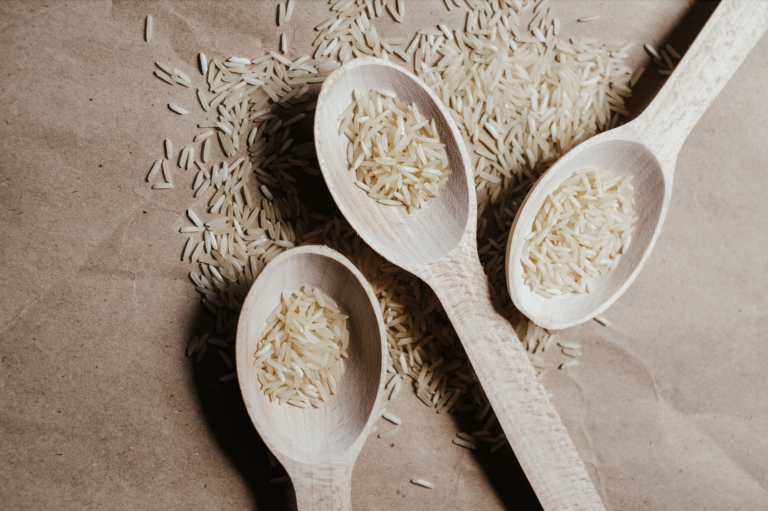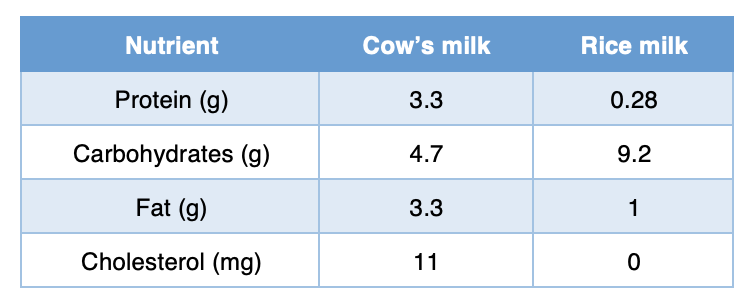There’s a clear winner here


Alright, the number of plant-based milks is clearly getting out of control. There’s so many choices that it’s hard to know which options are best nutrition-wise, or at least comparable to cow’s milk, and which ones are just a waste of money and calories.
So, I decided it’s time to break things down on a one-to-one direct comparison. You could call it a food fight (my boyfriend thought of this pun, not me).
The first competitors up — rice milk and cow’s milk. Which is a better option from a nutrition stand-point?
If you read on, you’ll notice this isn’t even a fair fight!
Protein Content


I’m starting with protein because I think it’s probably the number one reason people drink cow’s milk. Plus, there’s a HUGE difference in the protein content between rice and cow’s milk.
If you drink 100 mL of cow’s milk or 100 mL of rice milk, the protein you’ll consume will be 3.3 grams versus 0.28 grams, respectively. Basically rice milk has no protein. If you look at the nutritional label of rice milk in the grocery store you’ll see a big, fat 0 for protein.
So, if you’re someone who drinks milk for the protein, you really couldn’t pick a worse substitute than rice milk.
Protein Quality
It’s not just the protein content in rice milk that’s atrocious, the protein quality is also low.
When I say protein quality I’m talking about the specific amino acids that make up the proteins. Some amino acids are essential which means our body can’t make them, so we have to consume them. Other amino acids are non-essentialsince the human body can produce them.
Generally, plant-derived proteins have less of the essential amino acids our bodies need to grow and maintain health. As is the case for rice protein.
In comparison, cow’s milk contains relatively large amounts of all 9 essential amino acids.
So, when it comes to protein, I hope you’re getting the hint that cow’s milk is just treading on rice milk.
Carbohydrates


Well, things aren’t going to get much better for rice milk when we look at the carbohydrate content.
Let’s pretend we have a glass of 100 mL of cow’s milk and 100 mL rice milk. The total carbohydrates would be 4.7 grams and 9.2 grams, respectively. That’s going to double your carbs intake if you drink rice milk!
Rice milk is notoriously rich in sugars and you probably know this intuitively! But, I’ll admit all that sugar does give it a nice, sweet taste.
Fat


Depending on whether you drink 2%, 1%, or skim milk the amount of fat in 100 mL of cow’s milk will be 2 grams, 1 gram, or essentially 0 grams of fat.
Rice milk is somewhat comparable with about 1 gram of fat per 100 mL.
The composition of the fat in each type of milk does vary.
Cow’s milk is predominantly saturated whereas rice milk is more unsaturated, but with relatively low fat contents I don’t think it’s worth digging into much deeper.
Not to mention there’s been a lot of new research overturning our long held belief that saturated fat is “bad” and unsaturated is “good.”
Cholesterol


Let me tell you something about cholesterol — it’s only found in animal products.
If you’re eating plants, you never have to worry about cholesterol intake. What I’m trying to say is, rice milk will have no cholesterol because, you know, rice is a plant.
Cow’s milk on the other hand has about 11 milligrams of cholesterol per 100 mL.
So, if you’re watching your cholesterol, any food that’s plant-based might be a good option to consider.
Vitamins & Minerals


Most plant-based milks (and cow’s milk) are fortified to include certain vitamins and minerals.
Historically, cow’s milk has been fortified with vitamin D since it works with calcium to build strong bones. More recently, as plant-based milks have been launched, they are fortified to simply reflect the composition of cow’s milk.
For example, rice milk contains similar levels of calcium, magnesium, and iron to cow’s milk but does have higher amounts of vitamin A and E.
Allergies


I actually think this is an area that rice milk really shines through.
There are a lot of people who can’t drink cow’s milk because of lactose intolerance or some type of allergy. Plus, plant-based milks made from soybeans or almonds are also included in the big 8 food allergens in the U.S.
For many people having issues with food sensitivities and allergies, rice milk may be one of the few beverages they can enjoy.
The Final Verdict
If you read this article, it’s probably pretty obvious that I think cow’s milk is the clear winner here.
It has way more protein, a higher quality of protein, and much fewer carbs while retaining a similar level of many vitamins and minerals.
But, if you rapidly scrolled down to this point, here’s the tldr.


To be honest, I would probably just drink a glass of water instead of wasting the calories on rice milk. Plus, I’m pretty certain I already eat way too many carbs (thanks pasta) to drink them in rice milk too.
So, DING DING DING, that’s the end of the first food fight!
Cow’s milk is the first winner.

